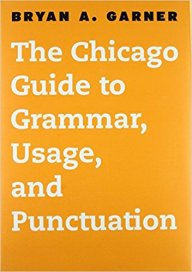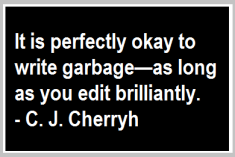Authors who want to take their books from idea to paperback must become project managers. Like any other endeavor, writing and successfully taking your novel to publication has many steps that take it from idea to proto-product to completion. It doesn’t matter if you are going indie or sticking to the traditional route.
 Then there is the marketing of the finished product, but that is NOT my area strength, so I won’t offer any advice on that score.
Then there is the marketing of the finished product, but that is NOT my area strength, so I won’t offer any advice on that score.
Even on the surface, writing fiction is complex.
We all know a high-quality product when we see one. The manufacturer didn’t make it out of cheap components. They put their best effort and the finest materials they could acquire into creating it. Because the manufacturer cared about their product, we are proud to own it.
For authors, the essential component we must not go cheaply on is grammar. The way we habitually structure our prose (our voice) adds to the feeling of depth. We must have a fundamental understanding of basic mechanical skills as they are the rules of the road and prevent confusion:
- Grammar
- Punctuation
If you have a limited knowledge of grammar, your first obligation is to resolve that. The internet has many easy-to-follow self-education websites to help you gain a good understanding of basic grammar in whatever your chosen language is. One site that I like is https://grammarist.com/.
 If you are writing in US English, I can highly recommend getting a copy of the Chicago Guide to Punctuation and Grammar. If you are writing in UK English, purchase the Oxford A – Z of Grammar and Punctuation.
If you are writing in US English, I can highly recommend getting a copy of the Chicago Guide to Punctuation and Grammar. If you are writing in UK English, purchase the Oxford A – Z of Grammar and Punctuation.
Uneducated authors write erratic prose with inconsistent capitalizations, random commas, and use too many exclamation points. They show no understanding of how to punctuate dialogue, which leads to confusion and garbled prose.
Authors must know the rules of grammar to break them with style and consistency. How you break the rules is your unique voice.
Readers expect words to flow in a certain way. If you choose to break a grammatical rule, you absolutely must be consistent about it.
Ernest Hemingway, James Joyce, Alexander Chee, and George Saunders all have unique voices in their writing. All of them break the rules in one way or another, but they are deliberate and consistent. Each of these writers has written highly acclaimed work. Their prose is magnificent, and you never mistake their work for anyone else’s.
Alexander Chee employs run-on sentences and dispenses with quotation marks (which I find excruciating to read).
George Saunders writes as if he is speaking to you and is sometimes choppy in his delivery. But his work is wonderful to read.
We need a broad vocabulary, but we also need to be careful not to get too fancy with it. To be successful, we need an understanding of the tropes common to our chosen genre. We must employ those tropes to satisfy the general expectations of our readers. How we do that is our twist, the flavor that is our unique “secret sauce.”
We don’t consciously think about this, but organizational skills are critical because we want the story to flow easily from scene to scene. This is why successful authors are project managers, even if they don’t realize it.
The first aspect of this is to Identify your Project Goals. Your story is your invention. You want to sell that invention, so your effort and the materials you create it out of are what determine the quality of the finished product.
Some inventions are in development for years before they get to market. Others are complete and ready to market in a relatively short time. Regardless of your timeline, this is where project management skills really come into play.
I use a phased (or staged) approach. This method breaks down and manages the work through a series of distinct steps to be completed.
- Concept: The Brilliant Idea. Make a note of that idea, so you don’t forget it.
- The Planning Phase: creating the outline. Some people don’t need this step, but I do.
- The Construction Phase—writing the first draft from beginning to the end through multiple drafts.
- Monitoring and Controlling—This is where you build quality into your product.
 Creating a style sheet as you go. See my post on style sheets here: Self-editing: Ensuring Consistency.
Creating a style sheet as you go. See my post on style sheets here: Self-editing: Ensuring Consistency.- Finding beta readers and heeding their concerns in the rewrites.
- Taking the manuscript through as many drafts as you must in order to have the novel you envisioned.
- Employing a good line editor to ensure consistency in the quality of your product.
- Finding reliable proofreaders. (Your writing group is an invaluable resource.)
- Completion or Closing—
- Employing a cover designer if you are going indie.
- Finding an agent if you are taking the traditional route.
- Employing a professional formatter for the print version if you are going indie.
- Courting a publisher if you are taking the traditional route.
After that comes marketing, whether you are going indie or traditional. Both paths require serious effort on your part. But as I said earlier, I have no professional skills in the area of marketing. I recommend you seek professional help but be wary—the waters are full of starving sharks waiting to devour you and your savings.
 Write the basic story. Take your characters all the way from the beginning through the middle and see that they make it to the end. If you have completed the story and have it written from beginning to end, you can concentrate on the next level of the construction phase: adding depth.
Write the basic story. Take your characters all the way from the beginning through the middle and see that they make it to the end. If you have completed the story and have it written from beginning to end, you can concentrate on the next level of the construction phase: adding depth.
We will work on some of the sublayers of depth in our next series on the craft of writing. First up, we will examine why your story isn’t finished just because it now has an ending.








I appreciate this post. Project management is an important topic for writers to discuss. I feel like a lot of the “writing as a job” talk I see originates from agent and publisher blogs, but they naturally come at it from a different perspective.
As artists, it’s easy to get caught up in the creative parts of the work, since that’s naturally what we’re passionate about. The “job” aspects are annoyances. And, of course, many writers dream about writing a smash-hit bestseller that will make them rich enough to write on whatever schedule they feel like.
The truth is that most hard-working writers end up in the mid-list (or indie equivalent), and organizational skills like project planning and deadline management can make the difference between a sustainable writing career, profitable side-hustle, or writing hobby.
Looking forward to more posts in this vein.
LikeLiked by 2 people
@Samuel – Thank you for stopping by, and for your kind words. You brightened my day. 😀
LikeLiked by 1 person
Reblogged this on Chris The Story Reading Ape's Blog.
LikeLiked by 1 person
Thank you for the reblog, Chris! You made my day! ❤
LikeLiked by 1 person
Welcome, Connie 🤗❤️🤗
LikeLike
Pingback: Fundamentals of Writing: Project Management #amwriting | Life in the Realm of Fantasy #Tip – Plaisted Publishing
Reblogged this on Jeanne Owens, author.
LikeLiked by 1 person
😀 Thank you for the reblog!
LikeLike
First of all congratulations Connie on an excellent article. I think however (sadly) that perfect punctuation is no longer required (see what I did there-lol) or at least my publisher tells me that it should be simplistic now.
LikeLiked by 1 person
I agree that “perfect” isn’t necessary, but some knowledge of the basics is a good thing.
I have seen some exceptionally erratic submissions over the years, manuscripts that new writers had put a lot of sweat and tears into but which were rejected by the end of the third paragraph.
Writers who are guessing at punctuation randomly write things like: “this is it”. She said. (Which should be: “This is it,” she said.)
Punctuation is for the readers’ benefit. They are traffic signals that keep long strings of words flowing smoothly, so the reader remains involved in the story.
An editor I worked with many years ago pointed out that no editor has the time it would take to make an unreadable manuscript worth printing, and shouldn’t have to. She was right! So, my goal is to help people find the tools they need to make their amazing stories into something worth printing!
LikeLike